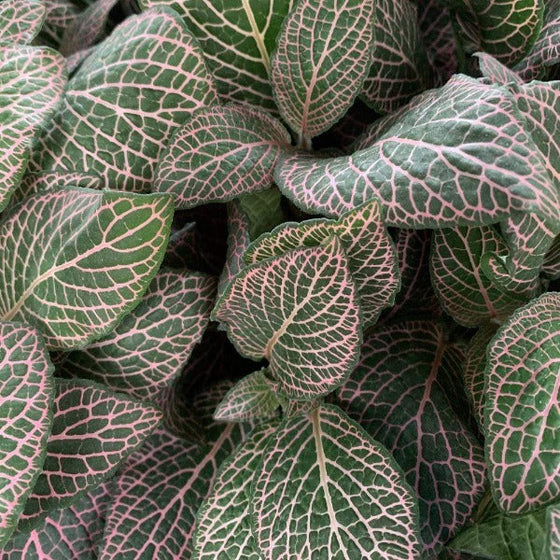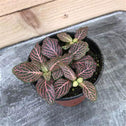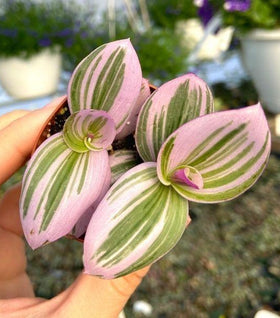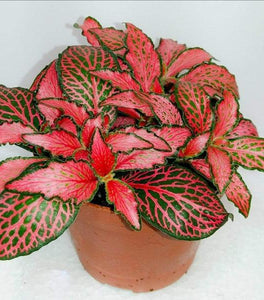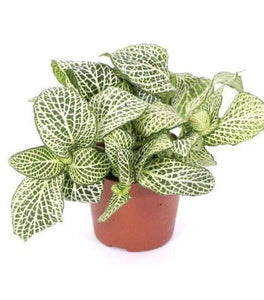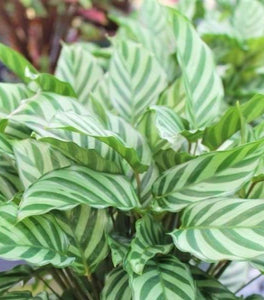Images Depict Mature Plants
Pink Fittonia Plants for Sale Online
Pink Fittonia Plants (Fittonia argyroneura) are tropical plants found with striking leaves of pink and green. Their foliage is primarily olive green with vein-like variegation taking on the alternative hue of pink. This houseplant does flower insignificant reddish to like spikes. However, they are rarely seen when grown indoors. Native to Peruvian and other South American rain forests, this colorful houseplant loves high humidity, bright indirect light, and well-draining soil conditions.
| Hardiness Zone: | 9-11 |
|---|---|
| Mature Height: | 2 to 5 inches |
| Mature Width: | 5 inches |
| Classification: | Colorful Foliage |
| Sunlight: | Fluorescent to bright, indirect |
| Habit: | Wider than it is tall, compact |
| Foliage: | Green and Pink |
| Soil Condition: | Well draining |
| Water Requirements: | Likes to dry out between watering |
| Uses: | Excellent indoors in offices or low light areas |
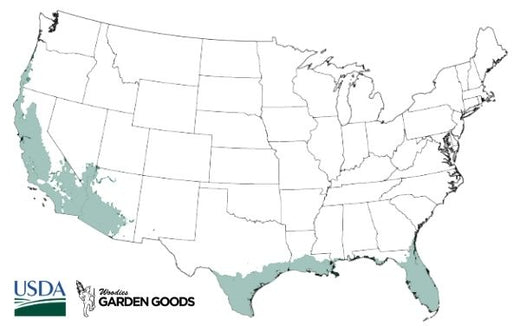
How to Care for Pink Fittonia
Be sure to read our planting instructions to ensure a healthy and happy plant for years to come!

What is the best soil for a Pink Fittonia Plants?
Pink Fittonia Plants need very well-draining soil and prefer to have slightly dry conditions. Regular potting mix or potting mix with sand mixed in works well for plants potted in containers. Pink Fittonia Plants like to be root bound. Be sure to pot your plant in a container with drainage holes. The correct pot and well-draining soil will allow your plant to drain any excess water that it does not need. If your plant does not drain, it will get root rot disease and cause serious damage.

What Kind of Sunlight Does My Pink Fittonia Plant Require?
Pink Fittonia Plants do well with bright, indirect light. An eastern or northern-facing window would be ideal. A western or southern window would work, as long as a curtain or blind prevents direct sunlight from touching the foliage. If you do not have great natural lighting in your home, your plant will thrive just fine under fluorescent lighting. Artificial lights are perfect alternatives when natural light doesn't suffice.
How Much Water Does My Pink Fittonia Plant Require?
Pink Fittonia Plants like to dry out occasionally between watering. They will tolerate staying moist but prefer not to have constantly wet soil. Pink Fittonia Plants appreciate humidity; a pebble tray or window in the kitchen or the bathroom would suffice. Be sure to plant your Pink Fittonia plant in a container with excellent drainage holes. Doing so will allow your plant to drain out any excess water it does not need. If your plant holds too much water, its roots will rot and cause serious damage.
What Kind of Fertilizer Does Pink Fittonia Plants Need?
Any all-purpose foliage fertilizer will work for Pink Fittonia Plants. Indoor houseplant fertilizers fall into two groups: water-soluble, liquid quick release, and granular, slow-release fertilizers. Jack's Classic Indoor plant food works well as a powder, quick-release fertilizer. When it is mixed with water, it quickly provides nutrients to a plant that has been in a container for an extended time. Osmocote Indoor/Outdoor is a granular, slow-release fertilizer used while potting and planting. Any fertilizer offers nutrients that help plants transition to a new environment. A common occurrence with other plants in this family (less so with Pink Fittonia Plants) is for the tips or edges of the leaves to turn brown. This issue can be caused by fertilizing when the plant is dry, using a fertilizer high in salts, or extremes in watering (going from too wet to too dry). While this won't kill the plant, it does start to look unsightly. It's crucial to make sure the plant has been watered recently before using a water-based fertilizer.

